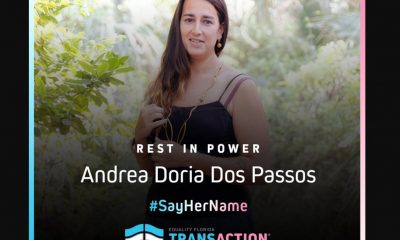homepage news
Transgender Southerners face rampant discrimination, poverty
Katrina ‘absolutely devastated’ trans services in New Orleans
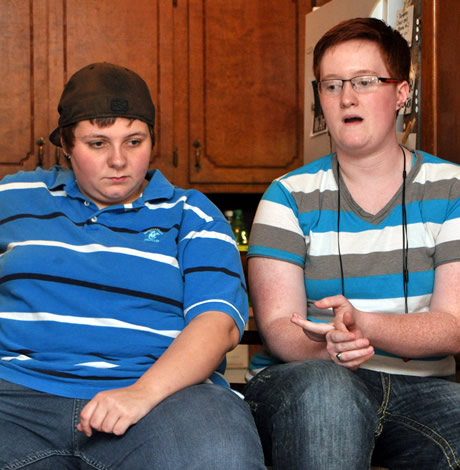
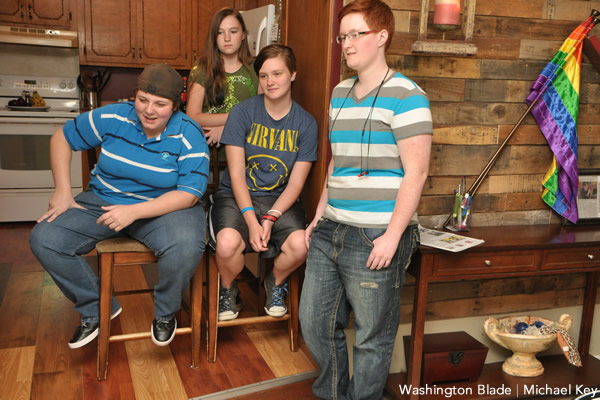
Members of the Dandelion Project gather to discuss LGBT issues in Laurel, Miss., on July 9. (Washington Blade photo by Michael Key)
LAUREL, Miss. — Caylee, a young transgender woman, was leaving a local Walmart earlier this month with her fiancé, Michael, when she said three “rednecks” in the lobby “said something smart.”
Caylee told the Washington Blade during a July 9 meeting of the Dandelion Project, a support group for LGBT people who live in Laurel and surrounding areas of the Mississippi Pine Belt, that the men called her and her fiancé “faggots” and asked them “what kind of sex acts we would be performing on each other that night.” She said they chased her and Michael to their car and jumped on top of it as they drove away.
“After that she wouldn’t hold my hand for a week in public and didn’t want to be around me in public because of the fear,” said Michael as he and Caylee sat on a couch in the living room of Dandelion Project co-founder Brandiilyne Dear’s small house on the outskirts of Laurel.
The trans people with whom the Blade spoke earlier this month in Mississippi, Louisiana and Alabama said they routinely experience harassment, discrimination and even violence because of their gender identity and expression.
Aiden, a 21-year-old trans man from Laurel, Miss., said during the Dandelion Project’s July 9 meeting that people sometimes tell him to “stop trying to act like somebody that you’re not.” He told the Blade that some of his classmates also harass him.
“I had people that didn’t care about it, and then I had some people that bullied me for it,” said Aiden.
Nathan Gage, a 19-year-old from Waynesboro, Miss., who came out as “gender queer” earlier this year, told his mother he was a lesbian when he was in ninth grade.
“She thought that my school did it to me,” Gage told the Blade during the Dandelion Project’s July 9 meeting. “She thought that the people I was hanging out with like that she knew turned me into being gay. She took my phone. She took everything from me. I wasn’t allowed to do anything.”
Gage said his mother has grown to accept his sexual orientation — and gender identity and expression, but he said his stepfather has become less accepting of it. He told the Blade that the pastor of a church his family previously attended once preached about trans people.
“He had these bathroom signs that were not male or female,” recalled Gage. “He would preach about how it is a sin and there was one particular scripture that he would read. When he would read it he would look my way.”
Elizabeth Anne Jenkins, president of Louisiana Trans Advocates, told the Blade during a July 13 interview at a coffee shop in the New Orleans suburb of Metairie that she received anonymous prayers and stares when she went to restaurants after she began to transition in 2008.
Jenkins at the time lived in Hammond, La., a small city about 60 miles northwest of the Crescent City. She now lives in Metairie with her partner, Donna Jean Loy, who she met on a suicide prevention website for trans people in 2009.
“I was glad to get out of Hammond and come over here,” Jenkins told the Blade as Loy, PFLAG New Orleans Co-President Julie Thompson, Mary Catherine Roberts of Equality Louisiana and her partner, Johanna Williams, listened. “Hammond’s a small town and everybody knows everybody. I was big news for at least a couple of weeks until the newness wore off.”
A trans man of color who spoke on condition of anonymity said during a July 14 interview at a beachfront mall in Biloxi, Miss., that his friends and family were not surprised when he came out in 2011. He said people nevertheless continue to use female pronouns to refer to him.
A black male security guard looked at him as the Blade took his picture in front of a sandcastle a local casino built adjacent to a group of seats and couches on which parents with their children and older people were sitting.
“I don’t make a big deal out of it anymore,” said the trans man as Jena and Jennifer Pierce, a lesbian couple from Biloxi who legally married in Connecticut last December, listened. “If that’s what they see, you know I can’t really get upset. I haven’t started any hormones or anything yet. So I just kind of go with it, but it does bother me to be called he, she or it.”
‘We were just making it month-to-month’
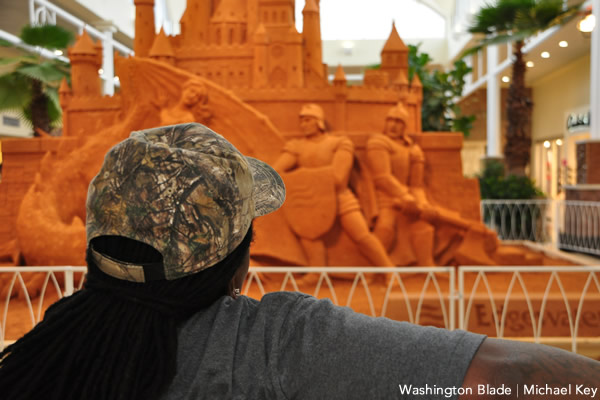
A trans man on the Mississippi Gulf Coast who asked to remain anonymous. (Washington Blade photo by Michael Key)
Mississippi, Louisiana and Alabama’s anti-discrimination and hate crimes laws do not include gender identity and expression.
The U.S. Census indicates Mississippi is the poorest state in the country, with slightly more than 22 percent of its residents living below the poverty level between 2008-2012.
Nearly 19 percent of Louisianans were living below the poverty level during the same period. The U.S. Census indicates slightly more than 18 percent of Alabama residents lived below the poverty level between 2008-2012.
Roughly 15 percent of Americans lived below the poverty level during the same period.
A 2012 report from the National Center for Transgender Equality and the National Gay and Lesbian Task Force found trans and gender non-conforming people were nearly four times more likely to have an annual household income of less than $10,000 than the general population.
Ninety percent of respondents said they experienced employment discrimination. Those who took part in the survey were also twice as likely to be unemployed because of their gender identity and expression.
These economic and employment disparities are even higher among trans people of color.
Ksaa Zair, a 29-year-old trans woman from Baton Rouge, La., who identifies as demisexual, told the Blade during a July 12 interview at a local restaurant with members of the Louisiana Trans Advocates, PFLAG Greater Baton Rouge, Baton Rouge Pride and Equality Louisiana that she has “never been successful at finding a job.”
She said she is “fairly sure” potential employers have refused to hire her because of her gender identity and expression. As a result, Zair’s best friend and roommate, Sergio Oramas, works as much overtime as he can at the Sears warehouse where he has worked for two months. They pay $600 a month for a two-bedroom apartment in the St. John neighborhood of Baton Rouge.
Oramas uses blue painters tape to hold his broken glasses together because he can’t afford to fix them.
“We actually have the cheapest place in this city,” Zair told the Blade. “We effectively live in one of the top five ghettos in Baton Rouge.”
Gage told the Blade that he had applied for jobs at local supermarkets, gas stations and fast food restaurants.
He said one potential boss with whom he had spoken was “iffy about it” because of his gender presentation.
“She barely shook my hand,” said Gage.
Gage currently works at a state-run school outside of Laurel where he works with people with mental illnesses and helps them obtain employment.
“I thought I’d have a problem, but they hired me,” he told the Blade. “That day I seemed to kind of go out of my comfort zone. I wore mascara just maybe to help me a little bit because I had applied for so many other jobs before and they all turned me down. I felt uncomfortable in the interview.”
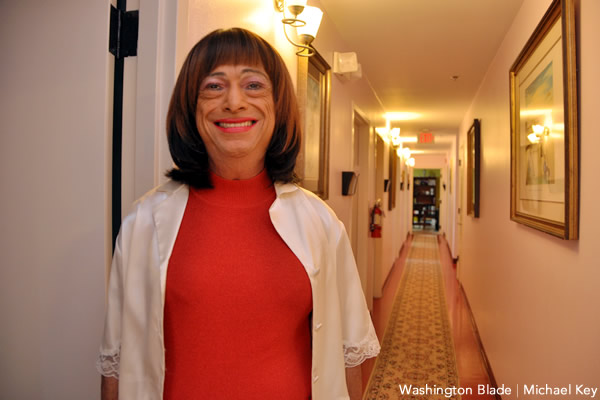
Miss Eddie at Belle Reve, a residence for people living with HIV/AIDS in New Orleans. (Washington Blade photo by Michael Key)
Miss Eddie, a 58-year-old trans woman living at Belle Reve, a residential facility in the Faubourg Marigny neighborhood of New Orleans for people with HIV/AIDS who also calls herself Missy, told the Blade during a July 14 interview she “discovered” last August “that I was a lady.”
She said she and her best friend, who was once her lover, lived in a run-down house in Kenner, a suburb of New Orleans near the city’s airport, for 14 years until he died in May. Miss Eddie said they used two of the four rooms for storage because the floor had sunken in and they could not live in them.
She told the Blade they tried to move after a year, but they could not afford anything over $500 a month.
“We were just making it month-to-month,” said Miss Eddie, who once worked as an Elvis Presley impersonator in the French Quarter. “We made some bad choices: Smoked some pot, spent some money there. Drank some liquor, spent money there, then cigarettes. We kind of got ourselves in a fix.”
Miss Eddie’s house had 15 inches of water inside of it during Hurricane Katrina that devastated southeastern Louisiana and the Mississippi Gulf Coast in 2005. She and her best friend stayed in their home in the weeks after the storm — and members of the National Guard along with volunteers brought them food, water and even cigarettes.
“We did not do without the whole time during the storm and after,” said Miss Eddie. “I didn’t pay no attention to the water.”
Katrina ‘devastated’ trans support services
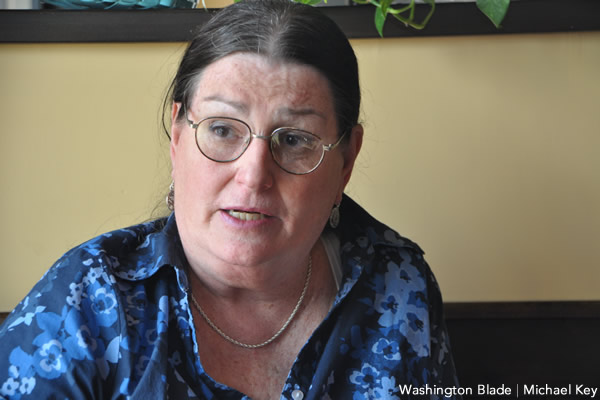
Elizabeth Anne Jenkins of Louisiana Trans Advocates in Metairie, La., on July 13 (Washington Blade photo by Michael Key)
Reports indicate that many trans people from New Orleans and other areas faced discrimination while living in shelters after Katrina.
Jenkins told the Blade she had heard one story of a trans woman of color who was arrested at a shelter outside of Houston because she took a shower in a women’s bathroom. She said the officers who took her into custody placed her with male inmates because she had yet to change the gender on her driver’s license to female.
“We were being cautioned at that time, as soon as we could in case if this ever happened again, to be able to have a driver’s license with the appropriate gender marker,” said Jenkins.
Jenkins added a number of doctors and other health care providers who treated trans people in New Orleans did not return to the city after Katrina. The doctor from which the trans man of color in Biloxi will receive his hormones is in the Crescent City, which is nearly an hour and a half drive from where he lives.
“[Katrina] absolutely devastated any kind of support you could get,” Jenkins told the Blade.
Lane Galbraith, founder of LGBT Wave of Hope in Mobile, Ala., told the Blade during a July 14 interview at a seafood restaurant overlooking Mobile Bay the health insurance plan he receives through his employer covers his hormone therapy and other transition-related care.
Access to hormones and other trans-specific health care remains a problem for those who remain economically disadvantaged.
Zair receives Medicare, but it does not explicitly cover hormone therapy because it is considered a cosmetic procedure. She pays $100 a month to an overseas website to receive her hormones.
“It is less legal than it sounds,” Zair told the Blade, noting she needs to see an endocrinologist because of side effects related to what she described as psychological problems she has. “I don’t have the information or the ability at hand to properly do it. I can’t sustain the actual levels of it.”
Jenkins and Loy each paid $12,000 to have their respective sex reassignment surgeries in Miami, where they spent a month recovering before they returned to Louisiana. Loy recently received breast implants in Birmingham, Ala.
It cost them $225 to legally change their name in Jefferson Parish, in which Metairie is located, and they were able to do it without an attorney. They simply needed a local judge to issue a judgment.
The process costs $550 in neighboring Orleans Parish in which New Orleans is located.
Jenkins and Loy had to secure an affidavit from the surgeon who performed their sex reassignment surgeries that stated they had undergone “irreversible gender surgery” when they legally changed their gender two years ago.
Alabama requires trans people undergo the same procedure and provide documentation of it before they can change the gender marker on their driver’s license. Mississippi mandates similar documentation, but the Human Rights Campaign says it remains unclear whether a “gender change” is sex-reassignment surgery.
Jenkins and Loy told the Blade that changing their gender marker with the Social Security Administration “was simple once we got it on our driver’s license.”
“I don’t think there are enough transgender people in Louisiana that the driver’s license places know what to do with us,” said Jenkins. “When we had it done, we took a copy of the law with us.”
Loy added most trans people — such as sex workers in the French Quarter — simply do not have enough money to pay for surgery or legally change their gender marker.
“We have a little bit of income,” she said. “So many of them like I say don’t have the money, they don’t have the money for hormones, they don’t have the surgeries.”
Trans prisoner denied hormone therapy
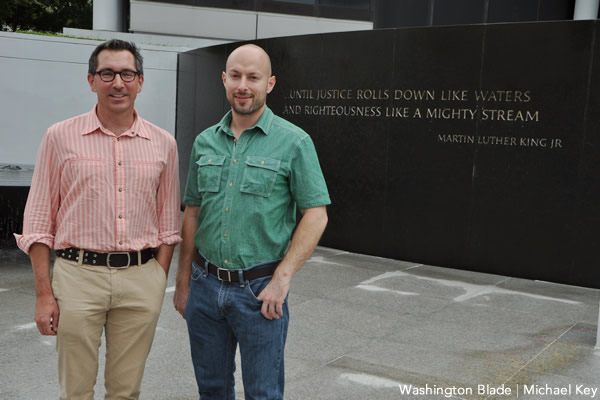
Southern Poverty Law Center Deputy Legal Director David Dinielli and lawyer Sam Wolfe at the Civil Rights Memorial in Montgomery, Ala. (Washington Blade photo by Michael Key)
The Southern Poverty Law Center, which is based in Montgomery, Ala., in May threatened to file a federal lawsuit against the Georgia Department of Corrections if it did not allow a trans inmate, Ashley Diamond, to receive hormone therapy.
David Dinielli, deputy legal director of the Southern Poverty Law Center, told the Blade during a July 15 interview in downtown Montgomery that Diamond has received hormone therapy “for over half of her life.” He said the Georgia Department of Corrections has denied her access to these treatments once she entered the Valdosta State Prison in 2012.
Dinielli told the Blade that Diamond lived in a house with drag queens and other gender non-conforming people in a town without any LGBT-inclusive housing protections. He said local police routinely searched their home for evidence of drugs, prostitution and other crimes.
Dinielli said police arrested Diamond after she “basically one day she kind of fought back.”
He told the Blade that local officials charged her with escape when he said she ran away after taking off her handcuffs to buy drugs at a drug house for them in exchange for lenient treatment.
“The bottom line is that she led a life that many people who can’t participate fully as themselves lead where some of her behavior was not in the confines of the law, right,” Dinielli told the Blade. “A lot of her problems arose from what often times are called survival crimes.”
Sam Wolfe, an attorney with the Southern Poverty Law Center who helped launched its LGBT Rights Project, has worked with a young trans woman who remains in an adult male prison in Alabama.
He told the Blade on July 15 that a prison guard had sex with her in a bathroom. Wolfe said she was released quickly after the allegations became public.
The prison guard eventually faced charges.
“She hadn’t murdered anybody,” said Wolfe. “She’s trans. She was in an adult male facility with murderers, with violent offenders and people taking advantage of her.”
Trans Miss. woman wants state to ‘fall into the Gulf’
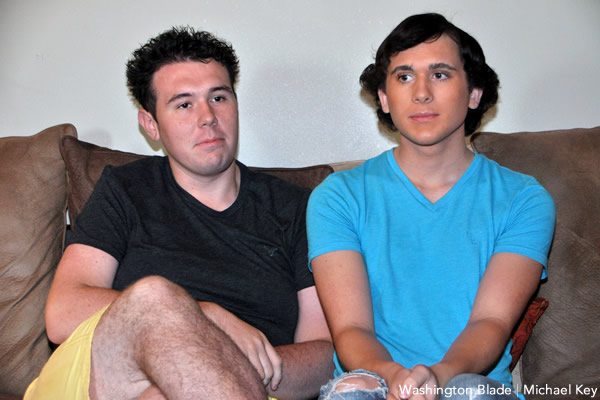
Caylee, on right, with her fiancé, Michael, spoke with the Blade during a meeting of the Dandelion Project in Laurel, Miss., on July 9. (Washington Blade photo by Michael Key)
Many of the trans people with whom the Blade spoke in Alabama, Mississippi and Louisiana remain proud of the states from which they come in spite of the pervasive discrimination and violence they continue to face.
“These are people that are hard-working and they have families,” said Galbraith. “They don’t want to move because somebody doesn’t accept them or doesn’t have tolerance or who they are and their family they’ve created.”
Caylee in Laurel, Miss., was far less forgiving toward those who have targeted her because of her gender identity and expression and the state in which they live.
“May Mississippi fall into the Gulf,” she told the Blade. “I would leave Mississippi and never look back.”
Editor’s note: Donna Jean Loy of Louisiana Trans Advocates was incorrectly identified as Donna Jean Roy in the original story. The Blade regrets the error.
homepage news
Honoring the legacy of New Orleans’ 1973 UpStairs Lounge fire
Why the arson attack that killed 32 gay men still resonates 50 years later

On June 23 of last year, I held the microphone as a gay man in the New Orleans City Council Chamber and related a lost piece of queer history to the seven council members. I told this story to disabuse all New Orleanians of the notion that silence and accommodation, in the face of institutional and official failures, are a path to healing.
The story I related to them began on a typical Sunday night at a second-story bar on the fringe of New Orleans’ French Quarter in 1973, where working-class men would gather around a white baby grand piano and belt out the lyrics to a song that was the anthem of their hidden community, “United We Stand” by the Brotherhood of Man.
“United we stand,” the men would sing together, “divided we fall” — the words epitomizing the ethos of their beloved UpStairs Lounge bar, an egalitarian free space that served as a forerunner to today’s queer safe havens.
Around that piano in the 1970s Deep South, gays and lesbians, white and Black queens, Christians and non-Christians, and even early gender minorities could cast aside the racism, sexism, and homophobia of the times to find acceptance and companionship for a moment.
For regulars, the UpStairs Lounge was a miracle, a small pocket of acceptance in a broader world where their very identities were illegal.
On the Sunday night of June 24, 1973, their voices were silenced in a murderous act of arson that claimed 32 lives and still stands as the deadliest fire in New Orleans history — and the worst mass killing of gays in 20th century America.
As 13 fire companies struggled to douse the inferno, police refused to question the chief suspect, even though gay witnesses identified and brought the soot-covered man to officers idly standing by. This suspect, an internally conflicted gay-for-pay sex worker named Rodger Dale Nunez, had been ejected from the UpStairs Lounge screaming the word “burn” minutes before, but New Orleans police rebuffed the testimony of fire survivors on the street and allowed Nunez to disappear.
As the fire raged, police denigrated the deceased to reporters on the street: “Some thieves hung out there, and you know this was a queer bar.”
For days afterward, the carnage met with official silence. With no local gay political leaders willing to step forward, national Gay Liberation-era figures like Rev. Troy Perry of the Metropolitan Community Church flew in to “help our bereaved brothers and sisters” — and shatter officialdom’s code of silence.
Perry broke local taboos by holding a press conference as an openly gay man. “It’s high time that you people, in New Orleans, Louisiana, got the message and joined the rest of the Union,” Perry said.
Two days later, on June 26, 1973, as families hesitated to step forward to identify their kin in the morgue, UpStairs Lounge owner Phil Esteve stood in his badly charred bar, the air still foul with death. He rebuffed attempts by Perry to turn the fire into a call for visibility and progress for homosexuals.
“This fire had very little to do with the gay movement or with anything gay,” Esteve told a reporter from The Philadelphia Inquirer. “I do not want my bar or this tragedy to be used to further any of their causes.”
Conspicuously, no photos of Esteve appeared in coverage of the UpStairs Lounge fire or its aftermath — and the bar owner also remained silent as he witnessed police looting the ashes of his business.
“Phil said the cash register, juke box, cigarette machine and some wallets had money removed,” recounted Esteve’s friend Bob McAnear, a former U.S. Customs officer. “Phil wouldn’t report it because, if he did, police would never allow him to operate a bar in New Orleans again.”
The next day, gay bar owners, incensed at declining gay bar traffic amid an atmosphere of anxiety, confronted Perry at a clandestine meeting. “How dare you hold your damn news conferences!” one business owner shouted.
Ignoring calls for gay self-censorship, Perry held a 250-person memorial for the fire victims the following Sunday, July 1, culminating in mourners defiantly marching out the front door of a French Quarter church into waiting news cameras. “Reverend Troy Perry awoke several sleeping giants, me being one of them,” recalled Charlene Schneider, a lesbian activist who walked out of that front door with Perry.

Esteve doubted the UpStairs Lounge story’s capacity to rouse gay political fervor. As the coroner buried four of his former patrons anonymously on the edge of town, Esteve quietly collected at least $25,000 in fire insurance proceeds. Less than a year later, he used the money to open another gay bar called the Post Office, where patrons of the UpStairs Lounge — some with visible burn scars — gathered but were discouraged from singing “United We Stand.”
New Orleans cops neglected to question the chief arson suspect and closed the investigation without answers in late August 1973. Gay elites in the city’s power structure began gaslighting the mourners who marched with Perry into the news cameras, casting suspicion on their memories and re-characterizing their moment of liberation as a stunt.
When a local gay journalist asked in April 1977, “Where are the gay activists in New Orleans?,” Esteve responded that there were none, because none were needed. “We don’t feel we’re discriminated against,” Esteve said. “New Orleans gays are different from gays anywhere else… Perhaps there is some correlation between the amount of gay activism in other cities and the degree of police harassment.”

An attitude of nihilism and disavowal descended upon the memory of the UpStairs Lounge victims, goaded by Esteve and fellow gay entrepreneurs who earned their keep via gay patrons drowning their sorrows each night instead of protesting the injustices that kept them drinking.
Into the 1980s, the story of the UpStairs Lounge all but vanished from conversation — with the exception of a few sanctuaries for gay political debate such as the local lesbian bar Charlene’s, run by the activist Charlene Schneider.
By 1988, the 15th anniversary of the fire, the UpStairs Lounge narrative comprised little more than a call for better fire codes and indoor sprinklers. UpStairs Lounge survivor Stewart Butler summed it up: “A tragedy that, as far as I know, no good came of.”
Finally, in 1991, at Stewart Butler and Charlene Schneider’s nudging, the UpStairs Lounge story became aligned with the crusade of liberated gays and lesbians seeking equal rights in Louisiana. The halls of power responded with intermittent progress. The New Orleans City Council, horrified by the story but not yet ready to take its look in the mirror, enacted an anti-discrimination ordinance protecting gays and lesbians in housing, employment, and public accommodations that Dec. 12 — more than 18 years after the fire.
“I believe the fire was the catalyst for the anger to bring us all to the table,” Schneider told The Times-Picayune, a tacit rebuke to Esteve’s strategy of silent accommodation. Even Esteve seemed to change his stance with time, granting a full interview with the first UpStairs Lounge scholar Johnny Townsend sometime around 1989.
Most of the figures in this historic tale are now deceased. What’s left is an enduring story that refused to go gently. The story now echoes around the world — a musical about the UpStairs Lounge fire recently played in Tokyo, translating the gay underworld of the 1973 French Quarter for Japanese audiences.
When I finished my presentation to the City Council last June, I looked up to see the seven council members in tears. Unanimously, they approved a resolution acknowledging the historic failures of city leaders in the wake of the UpStairs Lounge fire.
Council members personally apologized to UpStairs Lounge families and survivors seated in the chamber in a symbolic act that, though it could not bring back those who died, still mattered greatly to those whose pain had been denied, leaving them to grieve alone. At long last, official silence and indifference gave way to heartfelt words of healing.
The way Americans remember the past is an active, ongoing process. Our collective memory is malleable, but it matters because it speaks volumes about our maturity as a people, how we acknowledge the past’s influence in our lives, and how it shapes the examples we set for our youth. Do we grapple with difficult truths, or do we duck accountability by defaulting to nostalgia and bluster? Or worse, do we simply ignore the past until it fades into a black hole of ignorance and indifference?
I believe that a factual retelling of the UpStairs Lounge tragedy — and how, 50 years onward, it became known internationally — resonates beyond our current divides. It reminds queer and non-queer Americans that ignoring the past holds back the present, and that silence is no cure for what ails a participatory nation.
Silence isolates. Silence gaslights and shrouds. It preserves the power structures that scapegoat the disempowered.
Solidarity, on the other hand, unites. Solidarity illuminates a path forward together. Above all, solidarity transforms the downtrodden into a resounding chorus of citizens — in the spirit of voices who once gathered ‘round a white baby grand piano and sang, joyfully and loudly, “United We Stand.”

Robert W. Fieseler is a New Orleans-based journalist and the author of “Tinderbox: the Untold Story of the Up Stairs Lounge Fire and the Rise of Gay Liberation.”
homepage news
New Supreme Court term includes critical LGBTQ case with ‘terrifying’ consequences
Business owner seeks to decline services for same-sex weddings

The U.S. Supreme Court, after a decision overturning Roe v. Wade that still leaves many reeling, is starting a new term with justices slated to revisit the issue of LGBTQ rights.
In 303 Creative v. Elenis, the court will return to the issue of whether or not providers of custom-made goods can refuse service to LGBTQ customers on First Amendment grounds. In this case, the business owner is Lorie Smith, a website designer in Colorado who wants to opt out of providing her graphic design services for same-sex weddings despite the civil rights law in her state.
Jennifer Pizer, acting chief legal officer of Lambda Legal, said in an interview with the Blade, “it’s not too much to say an immeasurably huge amount is at stake” for LGBTQ people depending on the outcome of the case.
“This contrived idea that making custom goods, or offering a custom service, somehow tacitly conveys an endorsement of the person — if that were to be accepted, that would be a profound change in the law,” Pizer said. “And the stakes are very high because there are no practical, obvious, principled ways to limit that kind of an exception, and if the law isn’t clear in this regard, then the people who are at risk of experiencing discrimination have no security, no effective protection by having a non-discrimination laws, because at any moment, as one makes their way through the commercial marketplace, you don’t know whether a particular business person is going to refuse to serve you.”
The upcoming arguments and decision in the 303 Creative case mark a return to LGBTQ rights for the Supreme Court, which had no lawsuit to directly address the issue in its previous term, although many argued the Dobbs decision put LGBTQ rights in peril and threatened access to abortion for LGBTQ people.
And yet, the 303 Creative case is similar to other cases the Supreme Court has previously heard on the providers of services seeking the right to deny services based on First Amendment grounds, such as Masterpiece Cakeshop and Fulton v. City of Philadelphia. In both of those cases, however, the court issued narrow rulings on the facts of litigation, declining to issue sweeping rulings either upholding non-discrimination principles or First Amendment exemptions.
Pizer, who signed one of the friend-of-the-court briefs in opposition to 303 Creative, said the case is “similar in the goals” of the Masterpiece Cakeshop litigation on the basis they both seek exemptions to the same non-discrimination law that governs their business, the Colorado Anti-Discrimination Act, or CADA, and seek “to further the social and political argument that they should be free to refuse same-sex couples or LGBTQ people in particular.”
“So there’s the legal goal, and it connects to the social and political goals and in that sense, it’s the same as Masterpiece,” Pizer said. “And so there are multiple problems with it again, as a legal matter, but also as a social matter, because as with the religion argument, it flows from the idea that having something to do with us is endorsing us.”
One difference: the Masterpiece Cakeshop litigation stemmed from an act of refusal of service after owner, Jack Phillips, declined to make a custom-made wedding cake for a same-sex couple for their upcoming wedding. No act of discrimination in the past, however, is present in the 303 Creative case. The owner seeks to put on her website a disclaimer she won’t provide services for same-sex weddings, signaling an intent to discriminate against same-sex couples rather than having done so.
As such, expect issues of standing — whether or not either party is personally aggrieved and able bring to a lawsuit — to be hashed out in arguments as well as whether the litigation is ripe for review as justices consider the case. It’s not hard to see U.S. Chief Justice John Roberts, who has sought to lead the court to reach less sweeping decisions (sometimes successfully, and sometimes in the Dobbs case not successfully) to push for a decision along these lines.
Another key difference: The 303 Creative case hinges on the argument of freedom of speech as opposed to the two-fold argument of freedom of speech and freedom of religious exercise in the Masterpiece Cakeshop litigation. Although 303 Creative requested in its petition to the Supreme Court review of both issues of speech and religion, justices elected only to take up the issue of free speech in granting a writ of certiorari (or agreement to take up a case). Justices also declined to accept another question in the petition request of review of the 1990 precedent in Smith v. Employment Division, which concluded states can enforce neutral generally applicable laws on citizens with religious objections without violating the First Amendment.
Representing 303 Creative in the lawsuit is Alliance Defending Freedom, a law firm that has sought to undermine civil rights laws for LGBTQ people with litigation seeking exemptions based on the First Amendment, such as the Masterpiece Cakeshop case.
Kristen Waggoner, president of Alliance Defending Freedom, wrote in a Sept. 12 legal brief signed by her and other attorneys that a decision in favor of 303 Creative boils down to a clear-cut violation of the First Amendment.
“Colorado and the United States still contend that CADA only regulates sales transactions,” the brief says. “But their cases do not apply because they involve non-expressive activities: selling BBQ, firing employees, restricting school attendance, limiting club memberships, and providing room access. Colorado’s own cases agree that the government may not use public-accommodation laws to affect a commercial actor’s speech.”
Pizer, however, pushed back strongly on the idea a decision in favor of 303 Creative would be as focused as Alliance Defending Freedom purports it would be, arguing it could open the door to widespread discrimination against LGBTQ people.
“One way to put it is art tends to be in the eye of the beholder,” Pizer said. “Is something of a craft, or is it art? I feel like I’m channeling Lily Tomlin. Remember ‘soup and art’? We have had an understanding that whether something is beautiful or not is not the determining factor about whether something is protected as artistic expression. There’s a legal test that recognizes if this is speech, whose speech is it, whose message is it? Would anyone who was hearing the speech or seeing the message understand it to be the message of the customer or of the merchants or craftsmen or business person?”
Despite the implications in the case for LGBTQ rights, 303 Creative may have supporters among LGBTQ people who consider themselves proponents of free speech.
One joint friend-of-the-court brief before the Supreme Court, written by Dale Carpenter, a law professor at Southern Methodist University who’s written in favor of LGBTQ rights, and Eugene Volokh, a First Amendment legal scholar at the University of California, Los Angeles, argues the case is an opportunity to affirm the First Amendment applies to goods and services that are uniquely expressive.
“Distinguishing expressive from non-expressive products in some contexts might be hard, but the Tenth Circuit agreed that Smith’s product does not present a hard case,” the brief says. “Yet that court (and Colorado) declined to recognize any exemption for products constituting speech. The Tenth Circuit has effectively recognized a state interest in subjecting the creation of speech itself to antidiscrimination laws.”
Oral arguments in the case aren’t yet set, but may be announced soon. Set to defend the state of Colorado and enforcement of its non-discrimination law in the case is Colorado Solicitor General Eric Reuel Olson. Just this week, the U.S. Supreme Court announced it would grant the request to the U.S. solicitor general to present arguments before the justices on behalf of the Biden administration.
With a 6-3 conservative majority on the court that has recently scrapped the super-precedent guaranteeing the right to abortion, supporters of LGBTQ rights may think the outcome of the case is all but lost, especially amid widespread fears same-sex marriage would be next on the chopping block. After the U.S. Tenth Circuit Court of Appeals ruled against 303 Creative in the lawsuit, the simple action by the Supreme Court to grant review in the lawsuit suggests they are primed to issue a reversal and rule in favor of the company.
Pizer, acknowledging the call to action issued by LGBTQ groups in the aftermath of the Dobbs decision, conceded the current Supreme Court issuing the ruling in this case is “a terrifying prospect,” but cautioned the issue isn’t so much the makeup of the court but whether or not justices will continue down the path of abolishing case law.
“I think the question that we’re facing with respect to all of the cases or at least many of the cases that are in front of the court right now, is whether this court is going to continue on this radical sort of wrecking ball to the edifice of settled law and seemingly a goal of setting up whole new structures of what our basic legal principles are going to be. Are we going to have another term of that?” Pizer said. “And if so, that’s terrifying.”
homepage news
Kelley Robinson, a Black, queer woman, named president of Human Rights Campaign
Progressive activist a veteran of Planned Parenthood Action Fund

Kelley Robinson, a Black, queer woman and veteran of Planned Parenthood Action Fund, is to become the next president of the Human Rights Campaign, the nation’s leading LGBTQ group announced on Tuesday.
Robinson is set to become the ninth president of the Human Rights Campaign after having served as executive director of Planned Parenthood Action Fund and more than 12 years of experience as a leader in the progressive movement. She’ll be the first Black, queer woman to serve in that role.
“I’m honored and ready to lead HRC — and our more than three million member-advocates — as we continue working to achieve equality and liberation for all Lesbian, Gay, Bisexual, Transgender, and Queer people,” Robinson said. “This is a pivotal moment in our movement for equality for LGBTQ+ people. We, particularly our trans and BIPOC communities, are quite literally in the fight for our lives and facing unprecedented threats that seek to destroy us.”
The next Human Rights Campaign president is named as Democrats are performing well in polls in the mid-term elections after the U.S. Supreme Court overturned Roe v. Wade, leaving an opening for the LGBTQ group to play a key role amid fears LGBTQ rights are next on the chopping block.
“The overturning of Roe v. Wade reminds us we are just one Supreme Court decision away from losing fundamental freedoms including the freedom to marry, voting rights, and privacy,” Robinson said. “We are facing a generational opportunity to rise to these challenges and create real, sustainable change. I believe that working together this change is possible right now. This next chapter of the Human Rights Campaign is about getting to freedom and liberation without any exceptions — and today I am making a promise and commitment to carry this work forward.”
The Human Rights Campaign announces its next president after a nearly year-long search process after the board of directors terminated its former president Alphonso David when he was ensnared in the sexual misconduct scandal that led former New York Gov. Andrew Cuomo to resign. David has denied wrongdoing and filed a lawsuit against the LGBTQ group alleging racial discrimination.

-

 District of Columbia5 days ago
District of Columbia5 days agoCatching up with the asexuals and aromantics of D.C.
-

 South America5 days ago
South America5 days agoArgentina government dismisses transgender public sector employees
-

 Mexico4 days ago
Mexico4 days agoMexican Senate approves bill to ban conversion therapy
-

 Advice4 days ago
Advice4 days agoShould I divorce my husband for the hot new guy in our building?



